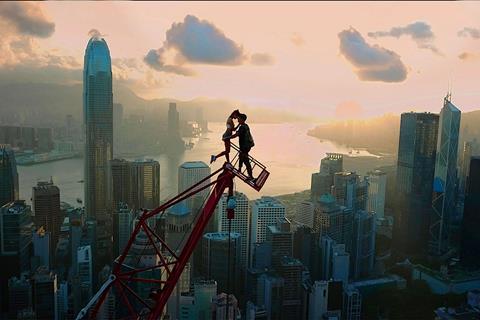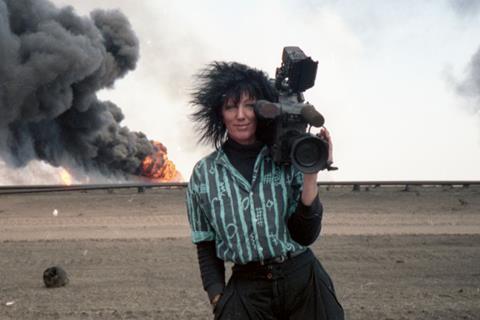
2024 Sundance marks something of a milestone in the documentary space for XYZ Films, best known for championing global genre fare like The Raid, Mandy, and The Invitation.
On Thursday opening night the Los Angeles-based company premieres two documentaries which it produced or executive produced. After years of relatively random engagement in the non-scripted format, producing the likes of Don Argott and Sheena M. Joyce’s Framing John DeLorean (2019) and Marq Evans’s 2021 Tribeca premiere Claydream (2022), the documentary division led by Tamir Ardon is in full flow, with multiple projects in the pipeline.
Jeff Zimbalist’s Skywalkers: A Love Story (premiering on Thursday, 9.45pm, The Ray Theatre) is the US Documentary Competition entry about a daredevil couple who journey across the globe to perform an acrobatic stunt atop the world’s last super skyscraper in a last-gasp bid to save their careers and relationship. Maria Bukhonina, Chris Smith, and Ardon produced, while XYZ Films CEO Nick Spicer is executive producer.
Thursday also brings the premiere of of Never Look Away (6.30pm, Prospector Square Theatre), which marks the directorial debut of Xena the warrior princess herself, Lucy Lawless. The film chronicles the life of trailblazing New Zealander and CNN camerawoman Margaret Moth, who repeatedly risked her life in war zones. XYZ Films’ Nate Bolotin, Ardon, and Maxime Cottray served as executive producers.
XYZ Films represents worldwide sales on both documentaries and Spicer and Ardon spoke to Screen on the eve of Sundance about their deeper dive into documentaries and teased a new Bigfoot project.
The company also represents North American rights on Midnight selection Krazy House starring Nick Frost and Alicia Silverstone, as well as Bruno Mourral’s Midnight selection Kidnapping Inc., and Alessandra Lacorazza’s US Dramatic Competition entry In The Summers.
How did the documentary division come about?
Nick Spicer: I’d known Tamir from UCLA grad school and the first doc that we did together was a project he brought to us, which became Framing John DeLorean, a hybrid documentary starring Alec Baldwin, which IFC released. We’d tried to do a scripted project about John DeLorean but there were competing projects and we just couldn’t get it done.
Working on the documentary with [co-directors] Don Argott and Sheena M. Joyce was an incredibly fun and creatively satisfying experience and we worked well with Tamir. So we sat down afterwards with Tamir and realised that when you make documentaries you don’t have the same creative restraints that you sometimes do working on a narrative film. We decided this was something we wanted to do more of and since then we’ve been quietly producing, executive-producing, and financing documentary features.
Why do you regard Sundance as a milestone?
Spicer: Making documentaries is a long process and we’ve produced and released a couple. It takes years to get a documentary together; it’s such a big commitment of time, creative energy, and money. Skywalkers: A Love Story and Never Look Away reflect a point where we feel our documentaries are really starting to come to fruition. This is the first time that we’ve had two documentaries at this level, premiering at a famous festival. Sundance is like a coming out party for us, a validation of what we’ve been quietly building over several years.
Tamir Ardon: We’re really hitting our stride right now and people are going to start seeing the pedigree of films and limited series that we’ve been working on for the last several years. Because it’s such a boutique division we have to be extremely curated with what we’re moving forward with.
How do you assess the market for documentaries?
Spicer: The independent market right now is kooky, and the independent market for docs is even more topsy turvy than it is for narrative. With documentaries it tends to be feast or famine; it’s hard to have a mid-range sale or success. It tends to be a streaming environment, or there’s a select handful that are truly theatrical features, but most of the consumption from the audience comes on streaming platforms. The successful limited series and features make a lot of noise, and they get a lot of viewership. And the ones that are not that top-tier tend to be really small; they don’t hit a wide audience, they don’t tend to be theatrical, and they don’t tend to be picked up by streamers as originals or all-rights deals. There are smaller, more bespoke distributors that do a very limited or platform release for these kinds of films and put them up on digital and try to get a streaming deal. The theatrical plays are few and far between and Skywalkers is one of those.
Give us a taste of Skywalkers.
Spicer: We’re very confident that this is going to be something that’s interesting to theatrical buyers, and platforms. It’s an incredible story about characters, regardless of what they’re doing, however what they’re doing is one of the most anxiety-inducing, visceral thing that you could possibly do as a human being. These people are climbing the highest building in the world, and doing acrobatics on rooftops and ledges. My palms were sweating 30 seconds into that movie and don’t stop until the end. We’re really confident with that one.
Ardon: An additional component that makes Skywalkers special is the fact that there are no talking heads throughout the entire film – it’s driven by verité. One of my favourite docs is Senna, which also had no talking heads and was driven by verité. That’s another example of how we try and push the boundaries of documentary filmmaking, and make it feel as narrative and cinematic as possible, which is a lot more palatable to a wider audience.
And Never Look Away?
Ardon: Another really special doc. It’s Lucy Lawless’s directorial debut about a fellow New Zealander, Margaret Moth, who was a total trailblazing, badass female photojournalist who worked primarily with CNN as a war correspondent. In the 80s and 90s she was in every conflict zone with her camera on her shoulder running directly into the danger. She passed away some years ago and this is a deep dive into her story. To give you a little anecdote: when she was on assignment in Sarajevo she had her jaw shot off by a sniper, and it required two years of reconstructive surgery. When she was ready to go back to work her bosses at CNN asked where she wanted to go and she said she wanted to go back to Bosnia to find her teeth. Lucy’s very giddy about this film.

How do you build documentaries from the initial concept?
Spicer: For productions generally we try to think of things from the get-go and produce accordingly. Is the idea potentially a limited series that somebody wants to live with over multiple episodes, or is it a feature? Who is the audience for it? If you get a theatrical audience out to see something, usually there has to be a big visual component to it where people want to see it on a big screen. We feel Skywalkers is that. If it’s something you can watch at home, we develop accordingly.
The buyers who buy docs is not a huge list, so it has to be pretty specific and targeted. And so that’s how we try to design it from the ground up; figuring out who the audience is from the get-go, making it accordingly, and then targeting those buyers.
What can we expect from your division in the future?
Ardon: We’re looking for very strong, filmmaker-driven projects. We develop like an independent studio. So we have projects where we’re developing internally, and then find filmmakers, and we have relationships with filmmakers that we constantly want to continue to grow.
Spicer: In the coming year, two years, you’re going to see a lot more documentary activity from us. We have filmmakers who we’re working with on multiple projects like [Skywalkers: A Love Story producer] Chris Smith and [Skywalkers director] Jeff Zimbalist. We’ve got other projects with Don and Sheena, and we’ve got other films with Marq Evans, who’s a filmmaker that we also represent and who directed a film called Claydream that we produced. We’re doing a new one with him that we’re incredibly excited about.
Can you tell us a bit about it?
Ardon: It’s about Bigfoot [AKA Sasquatch]. I don’t want to reveal too much but what we’re going to be doing with this film will create shock and awe with audiences around the world and drop a bombshell in terms of some old archival [footage] that we have exclusively obtained. We’re very excited about that one because that is such an iconic character and story. It’s going to be a feature and we’re currently in production on it.
When might that be ready?
Ardon: Next year is the goal.
And this isn’t a documentary but tell us what we can expect from Krazy House. It premieres at 10.30pm on Saturday at The Egyptian and marks the first English-language feature from Dutch filmmaking duo Steffen Haars and Flip van der Kuil.
Spicer: You will never see anything that is remotely like Krazy House. It is going to be divisive. I am so happy with how it turned out. We knew from the script that it was bonkers and we put money into it, executive producing from a very early stage.

























No comments yet